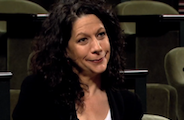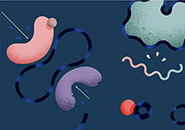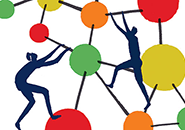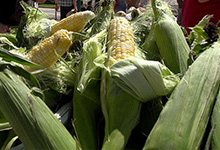
Scientific Discipline
Biochemistry, Biophysics
Related Links
Host Institution
Massachusetts Institute of Technology
Current Position
Dr. Baker is also Edwin Whitehead Professor of Biology at the Massachusetts Institute of Technology and an assistant molecular biologist at Massachusetts General Hospital, Boston.
Current Research
Mechanisms of DNA Transposition and Chaperone-Catalyzed Protein Remodeling
Research
Biography
Tania Baker might not have become a scientist if she hadn't been a babysitter in college. Her employer, geneticist Richard Burgess, decided to hire a full-time nanny but thought so highly of Baker that he gave her a job washing dishes in his laboratory at the University of WisconsinMadison.
Baker, who had been studying physical therapy, eventually worked her way up in the laboratory and switched to biochemistry, obtaining her bachelors degree. Soon after, she obtained her Ph.D. in biochemistry from Stanford University School of Medicine under the direction of Arthur Kornberg, who had won the Nobel Prize in 1959 for identifying a key enzyme involved in DNA synthesis.
Today, Baker studies AAA+ unfoldases, a large family of enzymes present in all organisms that maintain quality control of protein constituents within their cells. Proteins can become damaged during the stresses of cellular life and unfoldase complexes target them for destruction; otherwise, marred proteins build up and become toxic to the cell. Unfoldases also allow proteins to be recycled, if they are salvageable. Baker elucidates how unfoldases work on their targets and how the cell controls their action.
"Machines exist within a cell," Baker says, referring to the multipart unfoldases and prior research projects she has tackled. "I like to figure out the structure and function of these machines and how they work, and layer on top of that the interplay between how they work and how they are controlled to be active or inactive."
Baker credits encouragement from Burgess and another mentor at Wisconsin, Carol Gross, with whom she also did undergraduate research, for starting her on a career as a scientist. Although Baker was an excellent student in high school science, a teacher had challenged her achievements. Baker, who has dyslexia, was able under her school's individualized education plan to take science tests without a time limit, which, she says, the teacher had criticized. She didn't give up, though.
"A lot of learning disabled people get stubborn or they fail," she says. "I am stubborn, I guess."
Baker finally knew she had the bona fides to be a scientist after an undergraduate summer internship at Cold Spring Harbor Laboratory. "[The experience] gave me the confidence that I really liked science, because it could have been I just liked the people I was hanging out with in Wisconsin," Baker says. "But the fact that I went to Cold Spring Harbor, and that I really liked it, gave me the confidence to apply to a good graduate school." She went to Stanford because it had a small, research-oriented environment. She arrived in Kornberg's laboratory after it had purified the 25 enzymes and proteins necessary for DNA replication to occur at specific DNA sequences on the chromosome in an in vivo system. Prior work had been done with an artificial DNA substrate, in vitro. Baker helped figure out the sequential steps performed by each of the proteins to allow replication to begin.
Baker stayed with Kornberg for postdoctoral work, where she split her time between the lab and collaborating with him as coauthor of the second edition of DNA Replication. "When you do Ph.D. research, you get really focused on a few things and the opportunity to write a book opens your mind," Baker says.
For a second postdoctoral fellowship, she worked with Kiyoshi Mizuuchi at the National Institutes of Health, investigating transpositionwhen pieces of DNA called transposons, also known as jumping genes, incorporate themselves into a chromosome and move around.
These mobile genetic elements help sculpt the genome. Some cause mutations. Others may provide structural stability to chromosomes. Still other transposons carry antibiotic resistance genes for bacteria. With Mizuuchi, Baker identified protein machines that enable the mu transposon in E. coli bacteria to work.
In 1992, Baker came to MIT as an independent researcher and continued her mu research. She showed that the proteins she found in the mu system were analogous to proteins used by bacterial resistance transposons and retrotransposons. A retrotransposon acts like a retrovirus: It first makes an RNA copy of itself, turns it into DNA, and then integrates the DNA into the chromosome.
Her transposition investigations led her to unfoldases. To allow transposition, a group of proteins bind tightly to DNA and do not let go, she explains. In trying to understand how the process stops, she found an enzyme, ClpX, which stimulates the proteins to release DNA. ClpX is an unfoldase.
She became intrigued by these previously unknown unfoldases and now studies their mechanism of action to unfold or degrade proteins. She also has identified other proteins, called adaptors, that aid in the process. How the cell targets proteins for reuse or demolition by the unfoldases is an area of research in her lab. She also investigates the motor aspect of unfoldase "machines," which can use significant energy in their work.
Baker's philosophy of science is that every experiment tells a researcher something, even an unexpected result. When findings don't match a preconceived notion, she chases down the unpredictable. Clearly, pursuing the unanticipated, in babysitting or biochemistry, and persevering has served Baker well throughout her career.
Research Papers
Selected Research Papers



